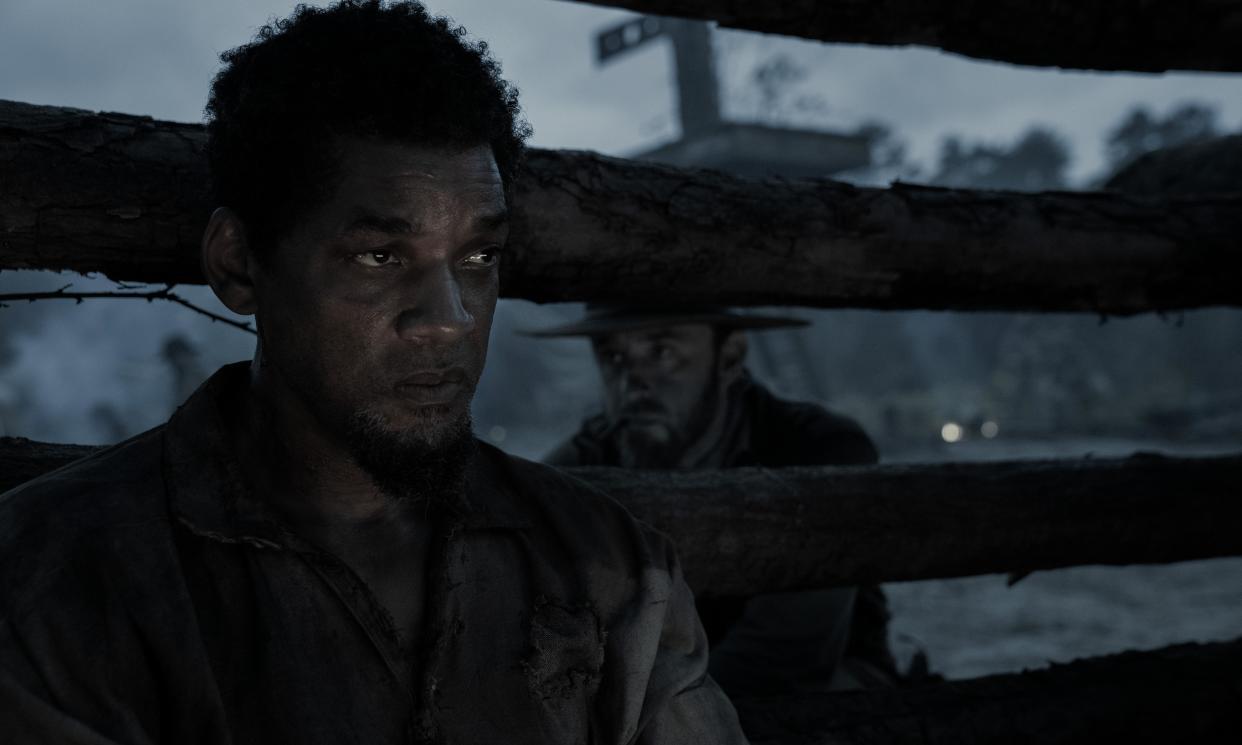Emancipation review – Will Smith flees slavery in fierce, sombre thriller

Whatever his current travails, Will Smith brings a movie-star presence to this brutally violent civil war drama, with a physical stillness and defiantly steady gaze. It is inspired by the true story of “Whipped Peter”, the escaped slave who in 1863, having enlisted at a Union military camp in Baton Rouge, Louisiana, showed his horrendously scarred back to two civilian photographers there, shockingly disfigured with a lattice of raised welts and whip marks. The resulting photograph became an iconic abolitionist image: evidence of the savagery and Peter’s own heroic dignity and calm.
Smith’s Peter is not shown being whipped in this way, but it is clear that, like all the enslaved people, he has been subject to systematic cruelty, a type of racist violence that is not a distinct punitive event, but a continuous fact of life, a condition of existence. The violence is embedded in the language used as the owners have an ugly way of referring to the slaves as “it”. The movie imagines Peter to be married to Dodienne (a fierce performance from Charmaine Bingwa), with whom he speaks French dialect, but is separated from his wife and children when he is bought by another owner and put brutally to work on the south’s railroad and military fortifications. Like most of the film, this chaotic camp is shot in a bleached-out near monochrome, with flashes of flame picked out in colour: a visual approach perhaps borrowed from Schindler’s List.
Peter is electrified by news that Lincoln’s soldiers are freeing slaves in Baton Rouge, across the swamp, and the jittery, trigger-happy white overseers, already unnerved by the enemy’s advance, are terrified that this rumour will make their slaves ungovernable. Peter escapes across the swamp with slave masters in pursuit on horseback and with dogs, led by an unruffled, pipe-smoking man called Fassel (coolly played by Ben Foster), a familiar figure in this kind of narrative. (Joel Edgerton played a similar slave hunter in the recent TV adaptation of The Underground Railroad, and like him, Fassel has a black man in his employ, to Peter’s disgust.) Peter faces a gruelling ordeal in the gator-filled swamp but there is no guarantee that the commanding officers of the Union army will be any less high-handed.
The movie creates for Peter an absent family which is to provide the quest narrative and also a stubbornly strong Christian faith, which he has perhaps garnered in the US (he is supposed to have been born in Haiti). Director Antoine Fuqua and screenwriter Bill Collage tread reasonably carefully with this religion and are not tempted to make Peter’s scars equivalent to Christ’s scourging; instead they contrive a quietly powerful, still moment when Peter, alone on a crude rowing boat that he has taken, looks out on to the sunlit landscape. It evidently looks beautiful to him but is shot so austerely that its beauty is restrained. Is Peter having an epiphany? Is he lost in thought? The scene is left unexplained and unnarrated.
Elsewhere, the movie works very efficiently as a thriller, with Peter on the run from his pursuers. There is a great moment when he stumbles into a burning plantation left in a surreal ruin; running into the house in search of food, he catches a glimpse of himself in a mirror, for clearly the first time in a long time, or maybe the first time in his adult life. Is he struck by how careworn he looks? Or just by the strange fact of his own existence and survival? Again, it is a mystery.
Perhaps the final showdown with the hated Fassel is anticlimactic, given that it has to come before the third act of Peter’s military enlistment, but this is a strong, fierce, heartfelt movie.
• Emancipation is released on 9 December on Apple TV+.

 Yahoo Movies
Yahoo Movies 
